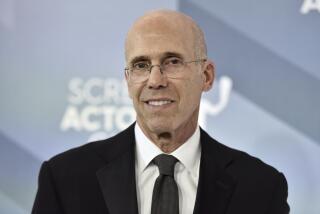Early Google Investors Set Sights on Another Dot-Com
- Share via
SAN FRANCISCO — Already rich from their prescient investments in breakthrough companies such as online search engine leader Google Inc., venture capitalists John Doerr and Ram Shriram think they have discovered their next gold mine.
It’s another dot-com with a zany six-letter name -- Zazzle, a start-up that makes customized T-shirts, posters and postage stamps.
Backed by their respective venture capital firms, Doerr and Shriram are investing $16 million in Zazzle and joining the Palo Alto-based company’s board of directors -- a job both men also hold at Google.
The investment, to be announced today, will provide a marketing springboard for Zazzle, which has relied almost exclusively on word of mouth since founder Robert Beaver II and his two sons, Bobby and Jeff, launched its website two years ago. The company has since grown to 100 employees.
While keeping a low profile, Zazzle has built a library of 500,000 digital images, including more than 3,500 items of copyrighted material licensed from Walt Disney Co.’s treasure trove of pop culture icons such as Mickey Mouse and Goofy.
Zazzle’s technology has “really opened up the vault of all our character art for the first time,” said Patrick Haley, Disney’s manager of new business development for consumer products.
Here’s how Zazzle works: Customers pick an image to be printed on a piece of merchandise, select a phrase from a menu and the order is supposed to be completed within 24 hours. The company so far has been making mostly T-shirts and posters. Beginning today, Zazzle will sell customized postage stamps in a partnership with mailing-equipment maker Pitney Bowes Inc.
A sheet of 20 first-class stamps will sell for $16.99 -- a 130% markup that matches the price that Los Angeles-based Stamps.com Inc. charges for a similar sheet of personalized postage.
The U.S. Postal Service is hoping the personal touch will become popular for commemorating special events such as weddings and birthdays, giving more people a reason to use “snail mail” in an era of increasing electronic communication.
It may sound like prosaic stuff, but Doerr is convinced that Zazzle is onto something big. Perhaps the best-known partner at Menlo Park, Calif.-based Kleiner Perkins Caufield & Byers, Doerr has long been one of the commercial Internet’s most outspoken zealots. His enthusiasm has rarely wavered, even when the dot-com bust obliterated hundreds of Internet start-ups.
“That was just the tail end of the first boom,” he said. “We are no further along than the early adolescence of the Web.”
Until recently, many venture capitalists have avoided Internet investments, particularly those in the field of e-commerce.
Since venture capitalists poured $28 billion into e-commerce start-ups in 1999 and 2000, the sector has attracted about $650 million in each of the last two years, according to PricewaterhouseCoopers and Thomson Financial. The pace picked up slightly during the first three months of this year when venture capitalists invested $181.5 million in e-commerce.
Doerr has previously hit the jackpot with early investments in Web browser pioneer Netscape Communications, online retailer Amazon.com Inc. and, of course, Google. But he also has invested in his share of flops, including Onsale.com, Homestore.com and Drugstore.com.
Google may become Doerr’s crowning achievement. The $12.5 million that he invested in 1999 when hardly anyone was interested in online search engines turned into a Kleiner Perkins stake worth $1.8 billion by the time the company went public 11 months ago. The stock has more than tripled since then, enabling Kleiner Perkins to retain a $1.7-billion stake in Google even though the firm has sold most of its shares.
Shriram, who first met Doerr as one of the early executives at Netscape, got involved in Google even earlier. After leading a small group of investors that placed $1 million in the search engine in 1998, Shriram retains a stake worth $1.3 billion.






